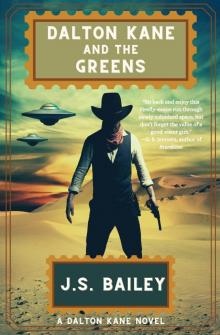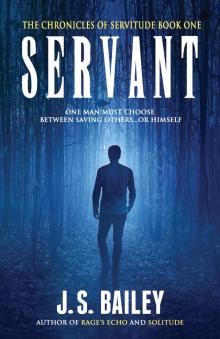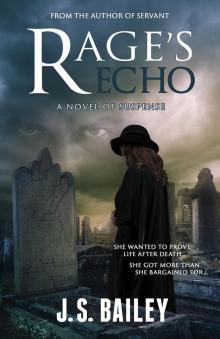- Home
- J. S. Bailey
Sacrifice
Sacrifice Read online
sacrifice
Copyright © 2015, 2017 J.S. Bailey
All rights reserved. Except as permitted under the U.S. Copyright Act of 1976, no part of this publication may be reproduced, distributed, or transmitted in any form or by any means, or stored in a database or retrieval system, without prior written permission of the publisher.
This book is a work of fiction. The characters, incidents, and dialogue are drawn from the author’s imagination and are not to be construed as real. Any resemblance to actual events or persons, living or dead, is entirely coincidental.
Published by Open Window
an imprint of BHC Press
Library of Congress Control Number:
2017938460
Print edition ISBN numbers:
ISBN-13: 978-1-946848-09-3
ISBN-10: 1-946848-09-3
Also available in trade softcover
Visit the author at:
www.jsbaileywrites.com &
www.bhcpress.com
Book design by
Blue Harvest Creative
www.blueharvestcreative.com
In loving memory of Herman, Fred, and Rob.
Therefore, I urge you, brothers and sisters, in view of God’s mercy, to offer your bodies as a living sacrifice, holy and pleasing to God—this is your true and proper worship.
—Romans 12:1, New International Version
This is my commandment: Love each other in the same way I have loved you. There is no greater love than to lay down one’s life for one’s friends.
—John 15:12-13, New International Version
GRAHAM WILLARD sat on the edge of the cot in his cell, unable to stop shivering no matter how hard he tried to still his limbs. It wasn’t even cold. If he had to guess, he would have said the temperature hovered around seventy degrees, give or take.
So it must have been nerves. He could feel them fraying like the edges of an old cloth. He hadn’t entered the world just to be shut away like an animal in the end, yet that’s what had happened. If they didn’t kill him for what he’d done, he could sit here rotting for the next two decades. One of his grandfathers had lived to be ninety-eight, and Graham was only seventy-five now.
Twenty-three years was far too long to stay here. If Graham wasn’t so afraid of what might come after, he would kill himself just to put an end to things.
Ever since he’d arrived in this abode of wasted lives, conflicting thoughts flitted through his mind. For the past year he’d been consumed with plotting Randy Bellison’s demise, and finally killing the young man had brought him great satisfaction, but only for a moment.
But did he die, or did he survive? I can’t remember…
Graham felt a strange hollowness inside of him. He’d loved Randy like a grandson but had to kill him anyway because—
Because why?
Because Graham would be at peace when Randy died.
But why? Why did I think I would be at peace? Why did I ever think that Randy needed to die?
He examined these thoughts from every angle and didn’t like the conclusion he drew from them. Randy was a good man. A pious man. A man who would have given his own life to save Graham if things had ever come to that. Any person who sought to kill such a man had to harbor great evil in his soul.
“I am not evil,” he said aloud.
Graham had killed many people, true, but he hadn’t hated them or wished them undue harm. He had used them to understand death better and grant them release from a world of illness and pain. Surely acts such as those couldn’t be considered sins. They should have made him a saint.
An inmate in a cell further down the block let out a cry in his sleep. Graham wondered what had brought the man here and if he remained sinless as well.
A sudden memory entered Graham’s mind: his daughters Kimberly and Stephanie playing in the yard of the old house near Hillsdale that he and his wife Lisa had finally sold once the girls were gone. There had been a swing set and a mound of sand they pretended was an ocean, and Stephanie would sometimes get the swing going high and then jump off to land in the imaginary water. Kimberly would then run into the house screaming that Stephanie was being dangerous again and to please make her stop before she killed herself.
He wished he could see his daughters now. He hadn’t laid eyes upon Stephanie in more than twenty years because Lisa had thrown her out of the house for sleeping with a young man from church, and he hadn’t seen Kimberly since before trying to kill Randy the first time.
He pictured Kimberly now: heavyset, with blondish hair and rosy cheeks, and then her face morphed into Lisa’s face, and Lisa, dear Lisa who’d ended up cheating on him for no logical reason at all, was crying. Graham, I’m so sorry, I never meant for things to go that far with him, it was just supposed to be drinks and dinner and nothing more than that, please forgive me, please, please…
And then from somewhere deep inside a new memory rose from the murk, and Graham saw himself as a young boy running through a golden field in the valley behind his grandparents’ house, just running and running, and he felt so free, and nothing terrible would ever happen to him because life was a beautiful thing without sorrow.
The sound of light footsteps coming his way brought Graham crash-landing back into the present, where Lisa was dead, his daughters aloof, and the golden fields of his childhood interred beneath a housing development.
He held his breath. Something in his gut told him this wasn’t a guard.
The footfalls ceased when a man dressed in civilian clothing appeared outside the cell. “Graham Willard,” he said with a note of amusement in his voice. “It’s good to see you.”
Graham’s mouth hung open in disbelief at the figure staring in at him. “Nate?”
The man dipped his head, remaining mostly in shadow. “It’s been a long time.”
Graham got to his feet and approached the bars, looking the man up and down to make sure his eyes didn’t deceive him. “I don’t understand. How did this happen?”
“A miracle from my father,” Nate said, his face twisting into a smile.
“Your father?”
“Yes, the one who speaks into my soul. I’m sure you know his name.”
Now Graham did feel a chill wash over him. “You’re speaking of our Maker?”
Nate gave a light laugh. “Don’t be so dense.”
“What other father could have done this to you, then?” But before Nate could reply, Graham understood. “Surely you don’t mean the Father of Lies.”
A smile. “It’s funny you should call him that. He has yet to lie to me.”
Graham’s mind spun like a top. All those conversations they’d had—could Nate have been deceiving him the entire time? “You told me you’re a devout man,” he said.
“I am.”
Nausea crept into Graham’s gut at Nate’s implication. “You did deceive me.”
“Oh, but it’s been so fun. You’ve become a rather useful tool in my hands. Just look at the things you’ve done since we met. Finding those poor sick people and slaughtering them like sheep.”
Nate couldn’t have known about that. Graham had never told him. “I was doing that before we met,” he said.
“Were you?”
Graham’s hands tightened into fists. “Do you think I don’t know what I’ve been doing all these years?”
“Yes, I do think that. The mind is an impressionable thing, Mr. Willard. It’s amazing what fantasies it can cook up without even being aware of it.”
“What I’ve done is no fantasy. I’ve brought peace to dozens of people. Dozens!”
“Starting with the drunk and then your grandmother.”
“I never told you that.” Had he?
Nate shrugged.
“And all the others?”
>
“Some you killed. Some you didn’t. I’ll bet you can’t even tell the difference.”
Graham glared at him. “You’re just trying to mess with me.”
“Am I?”
“Why are you here?”
“Because I’m finished with you. You’re used up. Can’t you feel it inside?”
Nate’s words filled him with alarm.
Nate went on. “It’s time for us to part ways, my dear friend. I admit I’ve enjoyed working with you. It’s a pity I can’t use you further.”
A spike of agony drove itself through Graham’s head the moment Nate turned and retreated in the direction from which he’d come, and he collapsed to the floor with a tear running down his cheek.
JACK WILLARD sat at the bar counter rolling a quarter across his knuckles, glaring at the bubbles in the glass of Bud Light in front of him.
His internal burners had set his anger to a low simmer.
“You all right there, Johnny Boy?” Chuck, the bartender, asked as he mopped up a spill with a rag that might have been yellow in a former life.
Jack jerked his head up. “It’s none of your business if I am or not.”
Chuck stuck out his bottom lip and gave a halfhearted shrug. “Sorry. You look like you’ve got a lot on your mind this evening.”
And you look like you’re asking for a black eye. He’d never liked Chuck. The man couldn’t mind his own business if his life depended on it. Jack put on a placating smile. “Don’t we all?”
Chuck gave a sharp bark of a laugh. “Not me. All’s on my mind is a good beer and a good babe. You let me know if you need anything else.”
Jack continued brooding. He was a wanted man who hadn’t been back to his apartment in days because police watched it day and night. His grandfather was in prison awaiting sentencing, and before good old Grandpa got carted away by a bunch of uniformed pigs, he’d said that he’d murdered his dying grandmother by helping her overdose on pills.
Jack set the quarter aside and took a slow gulp of the amber liquid that was supposed to help him relax. The woman Graham had killed would have been Jack’s great-great grandmother. He wondered what her name was. What she’d been like before she fell asleep forever at Graham Willard’s hand.
What bothered Jack more than anything was that hearing about the woman’s murder did bother him. It didn’t make sense. Graham had murdered scores of people over the years and Jack admired him for it. Too often people feared doing what they wanted because they would be punished if caught. Not Graham. Jack’s grandfather had been a bold, sly dog who’d found his calling and gone after it without reservation.
But he’d killed his own grandmother. Why, if that woman had never existed at all, Jack never would have been born, either, and that was a tragedy Jack wasn’t willing to contemplate.
Jack drank more of the beer, ordered another, and then picked up the quarter and started rolling it across his knuckles again.
A lanky, fortyish woman with limp, black hair that hadn’t been washed for at least a week staggered up to the bar and occupied the stool next to Jack’s. With the way she moved, she’d been drinking already that evening, most likely at a different bar since Jack hadn’t seen her when he came in. Wet stains were evident on her blouse and torn jeans—she must have sloshed a drink on herself prior to her arrival.
“That’s a neat little trick,” she said, eyeing the quarter as it traveled from Jack’s thumb toward his pinky and repeated the process. “How do you do that?”
Jack wasn’t particularly in the mood for talking to anyone, but he put on a smile and looked the woman in the eye. No makeup adorned her pale face. “It’s a piece of cake,” he said, bringing the quarter to a halt between his thumb and forefinger. “All you’ve got to do is—”
“What’ll it be, ma’am?” The nosy barkeep was back and giving the woman a lascivious look Jack didn’t feel she deserved.
The woman tore her eyes away from Jack’s quarter. “I’ll have a Miller Lite.” She slid two disintegrating five-dollar bills across the counter with a hand that trembled when she moved it. “You keep the change.”
Jack composed his face to hide his amusement. Too drunk to count money, too.
When a tall glass of beer had been filled from the tap and set in front of her along with a receipt, she returned her attention to Jack. “Sorry, honey. You were saying?”
“Quarter rolling is easy. Look.” He stuck the quarter between his thumb and index finger. “You flip it over the top until it’s here.” The quarter now rested on its edge between his index and middle fingers. “You do that all the way to the end. Then you pass it under your hand from your pinky back to your thumb and do it all over again. You have to do it a lot if you want to be fast.”
The woman tilted back her glass and licked her lips when she’d set it back down. “I don’t know,” she said, uncertain. “It looks tricky.”
Only because you haven’t tried doing it, you old bag. Jack knew her type. This was a woman who’d always wanted everything handed to her. If something looked too difficult to get right the first go around, then it couldn’t be done. She was probably one of those mooches who couldn’t keep a job and lived off of good old Uncle Sam, the world’s largest enabler. “Only at first,” he said. “Like I said, it takes practice.”
“I’ve never been much of one for practicing things.” She smiled, but there was no joy in it.
“So…are you from around here?” He set the quarter down to see if she’d try to pocket it when he wasn’t looking.
“Oh, no,” she said. “I’m from Ohio. I’ve been in Michigan for a long time, though.”
“That’s a long way from here.”
“Yeah, well, it needed to be done. Coming here, I mean. My name’s Adrian, by the way. Adrian Pollard.”
Jack wasn’t about to give her his real name, so he supplied her with a false one. “And I’m John Yockey. It’s nice to meet you.”
Technically, his name should have been John Yockey. Though he’d never met his father (his mother had conceived him at a wild party one summer in Sacramento), Stephanie Willard had told him the man’s name was William Joseph Yockey III. Jack was surprised she’d been lucid enough to remember it. At one time Jack had searched for the man and had some of his contacts look him up only to learn that Mr. Yockey sold insurance in Eureka and raised orchids as a hobby.
Like he was going to sit down with good old Dad and talk about flowers. It was surprising that someone who sounded so boring could have fathered someone like him.
Adrian’s cheeks flushed. “A young man with manners,” she said. “Wonders never cease.” She continued draining her glass.
“My mother always told me that manners are the lubricant of society,” Jack said, wearing a smirk. “So what brings you to Oregon?”
“Hold on a minute.” Adrian’s glass was empty so she called for another. Chuck informed her it would be on the house.
With her new glass in hand, she said, “I’m looking for my son.”
For the first time since she’d arrived at the bar, Jack was genuinely interested in their conversation. “Oh?”
Adrian’s expression darkened. “I was so young. So stupid.”
“Mother also said we can’t ever mature unless we make mistakes and learn from them.” Stephanie Willard had strived to pound a sense of morality into him, even after she’d pretty much failed at it herself.
The woman gave a halting laugh. “I learned from mine a little too late. I just hope I can fix what I broke.”
“Where does your son come into this?”
“He’s one of the things I broke.”
“You beat him?”
She shook her head. “I did a whole lot worse than that. I abandoned him.”
Jack had no words. His own mother had been looser than an unscrewed light bulb, but at least she’d had the sense to take care of him and his half sister Chloe, who had been conceived when Stephanie couldn’t make rent on the apartment one month and
slept with the landlord as payment.
Adrian went on. “His daddy and I were together two years when I got pregnant. I loved how I could feel our baby kicking around in there and I knew I’d be the best mother in the world. I was going to name him after my dad who died when I was just a little thing.” She paused to tuck a strand of greasy hair behind her ear. “He was tiny when he was born—just five pounds—but other than that, he was healthy as a horse. That’s what the doctor told me. I said I didn’t think horses were supposed to be that small and the doctor just laughed. So we went home, me and Ken and our new little boy. And then…” She blinked, and Jack saw that her gray-blue eyes had filled with tears.
Jack held his breath.
“I left them when my little baby was just a week old. And you want to know why?”
“Why?” Jack asked quietly.
“Because I was stupid!”
At this point several heads swiveled their direction. Jack saw some of the regulars snickering like this was the most entertaining thing they’d seen all week.
Adrian wasn’t finished. “I did it in the middle of the night, too, so Ken wouldn’t know I’d gone. That was the worst part because I really did love him. But I couldn’t stay. I didn’t know a thing about raising kids. So I left.”
Jack’s anger simmered again. If the woman couldn’t take the time to learn to flip a stinking quarter across her knuckles, then it only made sense that she wouldn’t bother learning how to take care of her own kid, either.
Adrian continued. “I had three other babies after that. One with a guy in Dayton, Ohio. Two more in Michigan. They’ve all got different daddies.”
“And you left all of them?”
She nodded.
The tiniest shred of sympathy he’d felt for the forty-year-old wreck of a woman sitting next to him evaporated on the spot. He remembered watching The Price is Right with his mother when he was a small boy. At the end of each show Bob Barker would remind viewers to get their pets spayed or neutered. Well, it wasn’t just pets that needed to be fixed. All the Adrian Pollards of the world needed to be fixed too so they wouldn’t keep passing sheer idiocy on to future generations.

 Dalton Kane and the Greens
Dalton Kane and the Greens Sacrifice
Sacrifice Servant
Servant Rage's Echo
Rage's Echo Ordinary Souls
Ordinary Souls Surrender
Surrender